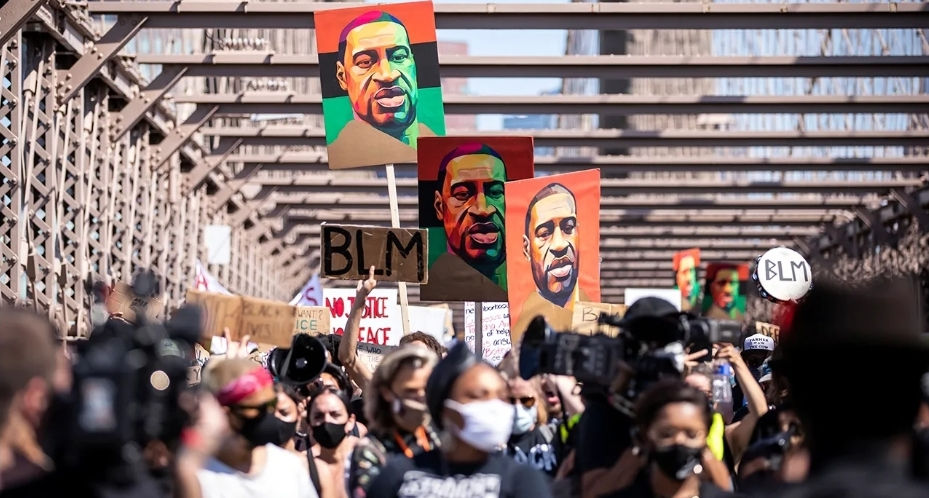If what’s happening right now feels like the beginning of a larger cultural shift, that’s because it is. The rollback of DEI initiatives is not happening in isolation. It’s part of a broader backlash made up of coordinated efforts to suppress conversations about race and equity.
President Trump’s rhetoric labeling DEI as “discriminatory diversity, equity, and inclusion nonsense,” and promised the United States would become a “merit-based country.” In framing DEI as discriminatory, Trump’s executive order on affirmative action revoked President Lyndon B. Johnson’s 60-year-old order that gave the Secretary of Labor the authority to ensure equal opportunity for women and people of color. Trump’s order similarly dismantled a series of executive actions taken by Biden to advance principles of equity and inclusion, and address pay inequities among underserved communities.
During the racial reckoning of 2020, in the wake of George Floyd’s murder, DEI became a buzzword. Corporations flooded social media with Black squares and hashtags, pledging to invest in racial equity, and the world watched as they lined up to declare their commitments to diversity, by pledging billions, making public apologies, and promising change. Fast forward to late 2024 into 2025, and the same companies are quietly dismantling the very initiatives they once heralded as proof of their “allies” status.
But even then, many questioned the sincerity of these efforts. Critics argued that much of this work was performative—a box-checking exercise to quiet public outrage. And they were right.
From McDonald’s to Meta, and from Amazon to Walmart, major corporations are cutting back on DEI programs and roles. This shift raises questions about their true values and priorities, suggesting that what many viewed as a long-overdue commitment to equity may have been little more than a fleeting PR exercise.
The corporate rollback of DEI programs isn’t happening in a vacuum—it unfortunately mirrors a broader, more insidious trend of dismantling equity efforts at the highest levels of government. “The Trump Administration’s harmful executive orders rolling back diversity, equity, and inclusion initiatives are an affront to all of us. Diversity is our strength and everyone who calls this country home deserves to thrive,” says Congresswoman Ayanna Pressley representing Massachusetts’ 7th Congressional District. She adds, “It is a fact that systemic oppression codified in our laws and budgets has harmed women, people of color, LGBTQIA+ people, those with disabilities, and other underserved communities in this country.”
This erosion of structural equity doesn’t just harm individuals—it undermines the very foundation of fairness in hiring and opportunity. “DEI initiatives don’t determine who gets hired; they ensure qualified candidates have fair access to consideration,” said Noreen Farrell, a civil rights attorney and executive director of Equal Rights Advocates. This foundational principle is lost in the culture wars, where DEI has been vilified and scapegoated for everything from train derailments to bridge collapses, and most recently for the tragic mid-air collision between a passenger jet and army helicopter while approaching Ronald Reagan National Airport near Washington, D.C. The rhetoric is absurd yet supported by those who believe DEI is not as a remedy to systemic inequities, but the source of them.
Brittney Cooper, Professor at Rutgers and Principal Investigator and Founding Director of the Race and Gender Equity Lab at Rutgers points out that the reality is that “We are living in a country that says it wants meritocracy but backlashes when that merit shows up in the bodies of folks who are not male, who are not white and have basically not had power before.”
What these folks fail to comprehend is that DEI does not advocate hiring people because they are racialized, queer, or disabled. It advocates that people are not excluded because they are. If hiring practices were truly “merit-based,” DEI wouldn’t even be necessary. But we don’t live in a world where meritocracy reigns—we live in a world where systemic inequities filter out overqualified candidates for all the wrong reasons.
These disparities don’t just affect hiring—they extend to the very way corporations engage with marginalized communities, especially when it comes to where resources are invested and whose voices they prioritize. For instance, corporations love to tout their “diversity” during Black History Month or Juneteenth sales, but their actions speak louder than their marketing. By dismantling DEI programs, these companies are effectively saying they’re happy to profit from Black dollars (which is projected to reach $1.8 trillion in the U.S. in 2025) but unwilling to invest in Black communities. This further indicates that Black lives and voices only matter when it’s both convenient and profitable.
Thankfully (at least for now,) organizations like Chase Bank, American Airlines, Southwest Airlines, United Airlines, Apple, Costco, and Delta continue their commitment to embedding DEI policies in workplace cultures. Let’s hope more companies join them in recognizing that inclusion is an investment and not a cost.
At the end of the day, progress threatens power, and what we’re witnessing is the Trump administration’s response. But this isn’t where the story ends. As disheartening as it feels, it’s also a stark reminder of how vital this work truly is. As Farrell says, “The door to solutions and innovation is closing,” but it’s not locked—and we hold the key. We are women for the culture, built to lead, built to rise, and built to push. And when that door doesn’t budge, we’ll do what we’ve always done: break it down, rebuild it stronger, and hold it open for those who come after us. The fight (unfortunately) continues, but guess what? So do we.



Comments